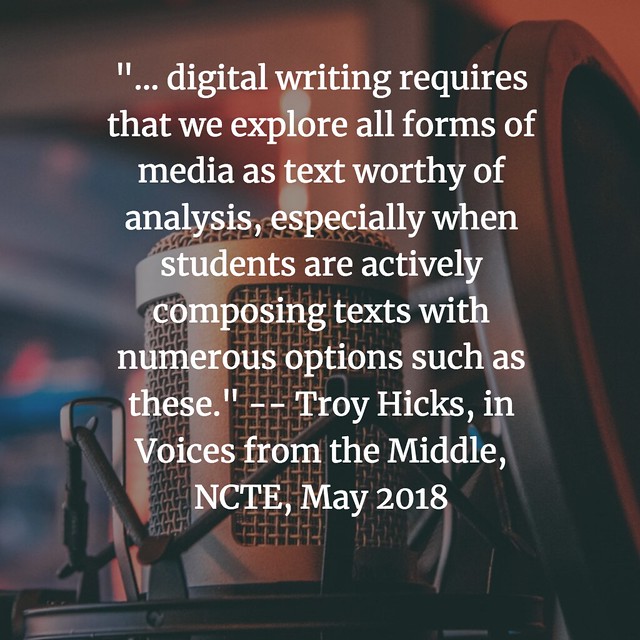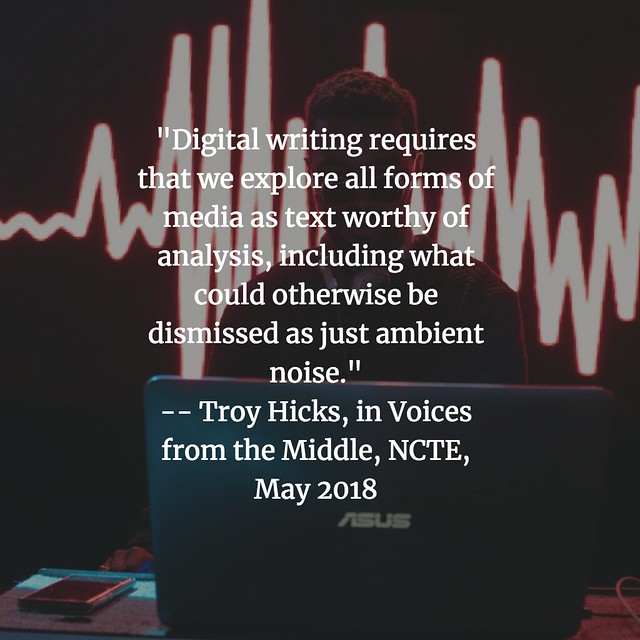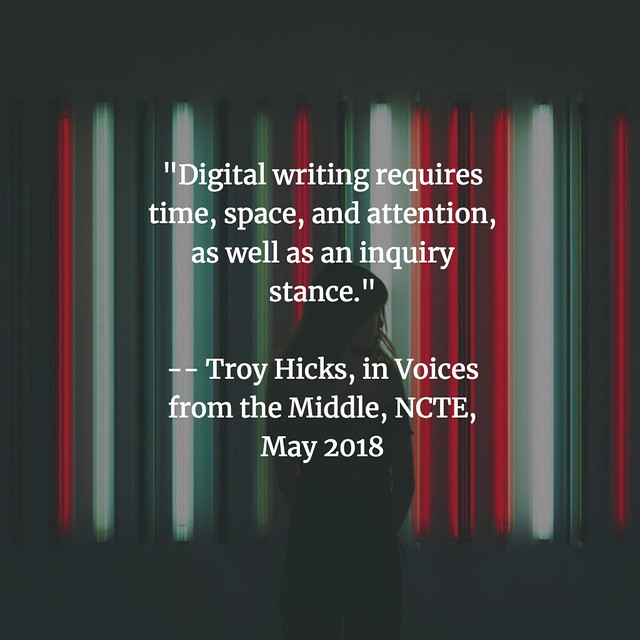Greetings NCTE working group! Curious about how your "crowd" of annotators adds a "layer" of conversation atop this document? The "crowd layers" public dashboard summarizes and visualizes annotations (by type), and provides additional information about text-participants, active days, tags, and more! To see collaborative activity associated with this document, click here.
- Feb 2019
-
Tags
Annotators
URL
-
- Jun 2018
-
www.ncte.org www.ncte.org
-
we also need to begin thinking like artists, web designers, recording engineers, photographers, and filmmakers.
Look no further than this annotation box for all that you suggest. Hypothes.is annotation is a multimedia genre all on its own in the process of being born. It is an ideal medium for teaching the old ways of writing and reading as well as the new ways of responding and creating. It is in its infancy and not locked down and scaffolded to death. So uptown.
-
we need to provide intellectual and emotional space for students to explore new ideas, gather their own evidence, and present academic arguments through media other than just the printed word.
I couldn't agree more. The big problem for us all is that often these spaces are so locked down, so scaffolded, so assessment driven that I despair of the system that created them and their capacity to create these spaces. I know we can do it and have done it, but do these exceptions prove my point? I do not want to come across as a ed-apocalyptic. Hell, the industrial model of learning is alive and "well" and shows little sign of abating.
I have to wonder if school is not, as Ivan Illich coined it, iatrogenic. Further, as a person who naturally "keeps on" (I have been a sheep farmer for over 30 years!) Are we guilty of educational iatrogenesis?
I also have to wonder whether we are all a bunch of Boxers saying, "I will work harder." Present company excluded.
Alison Gopnik argues that the youth of each generation are the product development branch of their cohort. They 'grow' the tools they need to solve the wicked problems of now. I want to help them do that. I do not want to give them the tools to solve the problems of the previous generation. We need to give them the space to make and do anew, but I want us to be more like concierges, not sages or masters. If this requires a new model then I say bring the revolution. It's coming anyway might as well join their camp.
-
lives even more strategically and creatively in the years ahead.
The fields of wild flowers, dried and shriveled
tamed by power. Mowed down for convenience.
No one would walk this hills to see wild flowers
Now plucked, gone.
Genetically engineered and packaged and patented
Take this seed and we will plant it.
We know best
We provide the water, light.
Grow your seed. Blossom your network
Just don't leave our walled garden
Everyone is here, its better we look the same.
Lovely blue flowers for all.
-
Digital writing has come a long way in the past decade
Often the wrong way. We went from an open web where everyone controlled where they published to a homogenized world of corporate silos where alogrithims influence what we read and thus what we write.
Web 2.0 became the corporate web.
True critical digital literacies must begin by taking back control of your identity.
-
As we move into the second decade of fully exploring and enacting digital writing practices in our classrooms,
I think we are moving into the third and not second decade. Although you and I presented at some of the earliest NCTE sessions on digital wrting and those were in 2007.
-
just over twenty years ago, that these processes of “reading, discovering, creating, and analyzing” various kinds of texts could still require the same fundamental skills crucial to the English classroom, and yet how our world—enabled by networked technology
Yes the technology has changed but they we we learn to write is not the fundamentally different.
Pedagogy first. Always
-
Digital Writing
Is the phrase "digital writing" as fraught as "digital native"? Or has it morphed into just plain writing? I still find myself bridging the gap analog -digital gap. For example, a summer goal is to make annotation of pdf's as close to paper as I can. I invested in a reMarkable tablet to make this happen. Do I consider it "digital writing"--yes and no. It is the merging of digital and analog. I do it so as to have less friction and quicker feedback with students. None of this matters if students can't take in the feedback or if my feedback sucks, but that is another pedagogic and compositional concern.
-
Please join me—and the other contributors to this issue—and continue the conversation
Answering the call with this annotation activity .. thanks, Troy!
-
http://knightlab.com/)
Need to explore? Me, too.
-
create rich, ethnographic portraits of their homes, neighborhoods, schools, stores, and other spaces
During one round of Hear My Home, I had taken my friend Anna's soundscape and refashioned it into a multimedia piece, complete with poem:
-
Rhythms of recent riots, pulses of contemporary protest marches, and the acoustics of American sit-ins serve as a starting point to explore the sonic intensities and politics of sound. In recent weeks, individuals have taken to the streets to demonstrate alliance with and affinity for making their collective voices heard.
Found Poem from That Passage:
starting pulse;
the streets
make rhythms of
our voices, heard,
the American acoustics
of politics, march
in protest, explore
contemporary sound.
https://www.youtube.com/watch?v=lIZ-uG2UTgI
(with apologies to Cassie and Jon)
-
#hearmyhome” project
f you are an educator, in what ways can you imagine incorporating and building soundscapes into your curriculum and practice as a classroom teacher? What benefits and/or constraints do you anticipate for yourself and/or your students?
-
digital writing requires that we explore all forms of media as text worthy of analysis, especially when students are actively composing texts with numerous options such as these.

-
Digital writing requires that we explore all forms of media as text worthy of analysis, including what could otherwise be dismissed as just ambient noise.

-
Digital writing requires time, space, and attention, as well as an inquiry stance.

-
et’s take a look at the future that’s happening right now
If I may, I have a Flipboard Magazine that I try to curate pieces about writing, teaching, learning and technology -- and how digital writing is pushing the boundaries of composition.
-
What it means to teach the English language arts with websites, apps, and social media continues to evolve quickly, both in terms of the tools as well as in terms of the practices.
And not all professional development has caught up -- this is the value of programs like EdCamp (where teachers lead the way) and the National Writing Project (my professional home as a teacher for the way ideas can bubble up from the classroom, and the 'teachers teaching teacher' is professional practice).
-
my book was able to keep the focus on the writing and the technology
I recommended this book to many people for this reason -- the focus was on the writing and the learning and development of the writer, not the technology itself. We too often get lost in the new and cool tech, and lose sight of the learning (and the reality that many of the tools now here will be gone, so adapting to technology platforms and environments is key.)
-
The Digital Writing Workshop (2009)
Video with Troy https://www.youtube.com/watch?v=Y20ACwt4eck
-
- May 2018
-
www.ncte.org www.ncte.org
-
https://ww2.kqed.org/education/collections/do-now/
-
Kevin Hodgson (@dogtrax on Twitter)
Aww ...

-
Troy Hicks
Troy Hicks has written extensively over the years about digital writing, and technology for expanding the notions of writing. I find his best work to be about how writing workshop might make a transition with the use of different aspects of technology. His focus is always on the learning and the writing, not the technology itself. Troy and I know each other through the National Writing Project and other adventures. Troy's blog is a good one to follow.

-
This piece comes from the NCTE journal -- Voices from the Middle -- May 2018. You can find the journal here.

-
